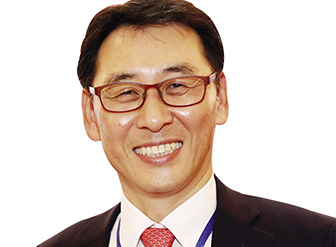Environmental concerns a top priority for Doosan Vina
 |
Following a July 6 meeting in Hanoi between Vietnam’s Deputy Prime Minister Trinh Dinh Dung and Doosan Vina’s CEO Yeon In Jung, the CEO talked to VIR’s Hong Anh about how environmental protection is an integral part of sustainable business and how Doosan Vina embodies this philosophy.
How important is environmental protection for businesses operating in Vietnam today?
Businesses can have either a positive or negative impact on the environment. Our corporate philosophy is that harming the environment is simply not acceptable. It’s a responsibility that we at Doosan Vina take very seriously and will not compromise on. We feel that it’s in everyone’s best interests to protect the environment because a healthy environment is ours, yours, your children’s, and everyone’s future. To harm it makes no sense, and damaging the environment is not sustainable or good business.
For those very reasons, we go well beyond what is required to ensure a bright future for the company, our employees, our neighbours, and Vietnam. During my meeting with Deputy Prime Minister Trinh Dinh Dung in Hanoi on July 6 and during his subsequent visit to our operations here in the south-central province of Quang Ngai on July 15, I committed to meeting all environment-related laws in Vietnam. Internally we stipulate that our emissions must be 25 per cent better than what is required by law and actually the readings are 50 per cent better, so we are very proud of our compliance.
How can the firm deal with waste and emissions resulting from the production process?
At Doosan Vina, we’re not only focused on growing our business, but we also consider the environment and its protection as a top priority.
The three ways the environment can be affected during manufacturing include discharging into the air, the water, or discarding solid waste. To prevent pollution, Doosan Vina has installed 15 systems to treat emissions - including 13 bag filtering systems, one activated carbon filter, and one wet scrubber. To keep the water clean, we have several water treatment facilities and systems to monitor any discharges. We have systems to treat sewage and industrial waste that operate around the clock and are designed to meet and exceed capacity.
On his follow-up visit to Doosan Vina on July 15, Deputy Prime Minister Dung toured our complex and had a chance to personally review our water treatment facility. I feel certain he was impressed with the cleanliness of the entire operation, and especially with the water treatment plant we have on-site. In all we can treat 100 cubic metres of industrial wastewater per day and 460 cubic metres of sewage water per day.
For solid waste, we have an intense recycling programme that classifies and sorts all solid waste and recycles 80 per cent on average. Anything that absolutely can’t be recycled is picked up and processed by certified and licensed refuse companies. And we go even further than that. Our packing department has come up with a way to recycle packing material by using it to make furniture for the elderly in the community, which have become quite attractive and functional additions to their homes.
What are significant milestones in Doosan Vina’s environmental compliance and monitoring?
Doosan Vina has been operating for nearly 10 years and we’ve received consecutive certifications for our environmental management system, such as ISO 14001 and OHSAS 18001. Additionally, Doosan Vina was honoured to be one of three provincial businesses awarded for its excellent performance in environmental protection by the Quang Ngai People’s Committee in 2012 and 2016. Doosan Vina achieved these results through its long-term commitment to environmental concerns, and by communicating to all workers and managers the importance of complying with the relevant regulation and laws.
The deputy prime minister said that Doosan Vina has made great strides in environmental protection through using modern technologies. What measures will Doosan Vina implement to continue its environmental protection?
Doosan Vina’s next step is to develop an environmental nanagement team. These individuals will have expertise and knowledge of Doosan Vina’s business, as well as an understanding of related environmental standards, technology, legalities, and documentation. In addition, they will know how to apply treatment systems and analyse the levels of waste. We will also continue to look for new technologies which can be applied to our waste management systems in order to increase efficiency and reduce impact on the environment.
We also have plans to launch courses for employees that will help them understand that everyone at the company has a role to play in managing emissions and waste.
What the stars mean:
★ Poor ★ ★ Promising ★★★ Good ★★★★ Very good ★★★★★ Exceptional
Latest News
More News
- Opella and Long Chau join forces to enhance digestive and bone health (February 06, 2026 | 18:00)
- Vietnam-South Africa strategic partnership boosts business links (February 06, 2026 | 13:28)
- Sun PhuQuoc Airways secures AJW Group support for fleet operations (February 06, 2026 | 13:23)
- Pegasus Tech Ventures steps up Vietnam focus (February 05, 2026 | 17:25)
- The generics industry: unlocking new growth drivers (February 04, 2026 | 17:39)
- Vietnam ready to increase purchases of US goods (February 04, 2026 | 15:55)
- Steel industry faces challenges in 2026 (February 03, 2026 | 17:20)
- State corporations poised to drive 2026 growth (February 03, 2026 | 13:58)
- Why high-tech talent will define Vietnam’s growth (February 02, 2026 | 10:47)
- FMCG resilience amid varying storms (February 02, 2026 | 10:00)















 Mobile Version
Mobile Version